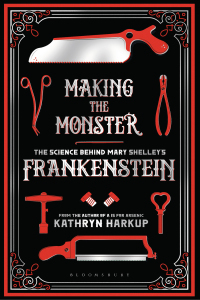Take a photo of a barcode or cover
When I saw another book by Harkup I immediately requested it, as A is for Arsenic made it to my top reads of 2016.
The title is a little misleading as it goes quite a bit in-depth into Shelley's life, as well at a look starting from the Enlightenment era to the beginnings of alchemy and chemistry. The bulk of the book is, of course, the inspiration behind the classic novel of Frankenstein.
I found this to be a very interesting read and thought that Harkup did a great job at making this interesting and easily understandable. However, the beginning of this one was a little slow though-(like it didn't start really until 20% in), to the point where I have been reading this off and on for two months. I was hoping for more Frankenstein and science rather than a complete biography of Shelley and Byron.
I would like to thank Netgalley, Kathryn Harkup and Bloomsbury USA for granting me the opportunity to read and review this wonderful book.
The title is a little misleading as it goes quite a bit in-depth into Shelley's life, as well at a look starting from the Enlightenment era to the beginnings of alchemy and chemistry. The bulk of the book is, of course, the inspiration behind the classic novel of Frankenstein.
I found this to be a very interesting read and thought that Harkup did a great job at making this interesting and easily understandable. However, the beginning of this one was a little slow though-(like it didn't start really until 20% in), to the point where I have been reading this off and on for two months. I was hoping for more Frankenstein and science rather than a complete biography of Shelley and Byron.
I would like to thank Netgalley, Kathryn Harkup and Bloomsbury USA for granting me the opportunity to read and review this wonderful book.
This year marks the 200 year anniversary of Mary Shelley’s novel ‘Frankenstein’, and with the anniversary came a plethora of titles about the author and the novel in question, as well as a brand new Penguin Black Spine edition of the original 1818 text. Among this multitude of new releases, this one is perhaps the most scientifically leaning, as the title implies: "Making the Monster: The Science Behind Mary Shelley’s Frankenstein". It is written by the author whose first book gave the same treatment to Agatha Christie and her use of poison, in A is for Arsenic. In 'Making the Monster', Kathryn Harkup discusses what influenced Mary Shelley in the writing of the ‘first science fiction novel’; a classic tale of horror and science gone awry, that is so prevalent in adaptations as to make it completely part of the common consciousness.
Full Review: https://weneedhunny.wordpress.com/2018/06/10/review-making-the-monster-by-kathryn-harkup/
Full Review: https://weneedhunny.wordpress.com/2018/06/10/review-making-the-monster-by-kathryn-harkup/
This review and others can be found on BW Book Reviews.
I was provided an ARC in exchange for an honest review. This did not influence my rating. Thanks to NetGalley and Bloomsbury for the advanced copy!
When I saw this book on NetGalley, I basically jumped at the chance to read it because I, admittedly, really enjoy Mary Shelley's Frankenstein. I wasn't raised watching the original Boris Karloff movie, but I loved Young Frankenstein and anything horror related. I was in high school by the time I read the book and was very impressed by how much I could still feel the impact of it.
In short, I love Frankenstein. So I had to read this once I saw this book was a thing.
The title, in a way, is a little misleading. It's not just about the science that was going on at the time Frankenstein was written. That is a huge part of the book, don't get me wrong, but it's also focused on Mary Shelley's upbringing, her affair and later marriage to Percy Shelley, her miscarriages, the political upheaval going on around her, and, of course, Enlightenment ideals with personhood and the advancement of the sciences. It's quite a dense book, one that weaves in a very close look at the text and what Victor Frankenstein did with Mary Shelley's life and the scientific advancements around her.
With all of those things going on, it could have come off as very dull and hitting me over the head with dates and people and facts to the point where I went cross-eyed and wanted the pain to end. But, I didn't. I never felt too overwhelmed with names and dates weren't a huge focus for me.
Harkup wrote this book to provide context to a story that is very well-known in today's culture. She does that in many ways and you can see how they link into the story very easily. All in all, a well-done nonfiction book that accomplished what it aimed to do.
I was provided an ARC in exchange for an honest review. This did not influence my rating. Thanks to NetGalley and Bloomsbury for the advanced copy!
When I saw this book on NetGalley, I basically jumped at the chance to read it because I, admittedly, really enjoy Mary Shelley's Frankenstein. I wasn't raised watching the original Boris Karloff movie, but I loved Young Frankenstein and anything horror related. I was in high school by the time I read the book and was very impressed by how much I could still feel the impact of it.
In short, I love Frankenstein. So I had to read this once I saw this book was a thing.
The title, in a way, is a little misleading. It's not just about the science that was going on at the time Frankenstein was written. That is a huge part of the book, don't get me wrong, but it's also focused on Mary Shelley's upbringing, her affair and later marriage to Percy Shelley, her miscarriages, the political upheaval going on around her, and, of course, Enlightenment ideals with personhood and the advancement of the sciences. It's quite a dense book, one that weaves in a very close look at the text and what Victor Frankenstein did with Mary Shelley's life and the scientific advancements around her.
With all of those things going on, it could have come off as very dull and hitting me over the head with dates and people and facts to the point where I went cross-eyed and wanted the pain to end. But, I didn't. I never felt too overwhelmed with names and dates weren't a huge focus for me.
Harkup wrote this book to provide context to a story that is very well-known in today's culture. She does that in many ways and you can see how they link into the story very easily. All in all, a well-done nonfiction book that accomplished what it aimed to do.
A special thank you goes to Netgalley and Bloomsbury Sigma for the eARC of this book. All thoughts and opinions are my own.
This book was a monster. (haha, did you see what I did there??) It took me over a week to read this book and it wasn't even that long, which is unheard of for me. The last time I took that long to read a book, I read Roots which took me a month and was back when I was in high school.
Basically, the premise of this book was conveyed in two fold. First, we have the somewhat biography of Mary Shelley, the author of Frankenstein. It wasn't complete by any means but it gave quite a bit about her life and how the events in her life contributed to Frankenstein. That was my favorite part because I just really love biographies. I knew nothing about Mary Shelley. Just the rumors that she kept her husband's heart in a jar when he died. Which, spoiler alert, actually happened.
The second part was the science behind Frankenstein. This is where the book lost me a little. I appreciate the hard work Kathryn Harkup put into researching the science but it was so dense. Everything was explained and I mean everything. Every single inventor, scientist, chemist, you name it, was given a mini bio and an in depth analysis of their experiments and how they contributed to the science behind Frankenstein. It got to be a bit much after a while. I think I glossed over a lot of it, which is unfortunate because I was generally curious about it. But I just couldn't get my brain to accept what I was reading.
But this book really helped me understand Frankenstein better. Even though, I think Victor was still an idiot, I understood him better. I think this would be a great supplement to have while reading Frankenstein, if you wanted to understand the science. I wish I had read this right after, as I would think my rating and overall likeness of the book would have been higher. I highly recommend this book for those that liked Frankenstein, enjoy learning about science or interesting in learning a little bit about Mary Shelley.
This book was a monster. (haha, did you see what I did there??) It took me over a week to read this book and it wasn't even that long, which is unheard of for me. The last time I took that long to read a book, I read Roots which took me a month and was back when I was in high school.
Basically, the premise of this book was conveyed in two fold. First, we have the somewhat biography of Mary Shelley, the author of Frankenstein. It wasn't complete by any means but it gave quite a bit about her life and how the events in her life contributed to Frankenstein. That was my favorite part because I just really love biographies. I knew nothing about Mary Shelley. Just the rumors that she kept her husband's heart in a jar when he died. Which, spoiler alert, actually happened.
The second part was the science behind Frankenstein. This is where the book lost me a little. I appreciate the hard work Kathryn Harkup put into researching the science but it was so dense. Everything was explained and I mean everything. Every single inventor, scientist, chemist, you name it, was given a mini bio and an in depth analysis of their experiments and how they contributed to the science behind Frankenstein. It got to be a bit much after a while. I think I glossed over a lot of it, which is unfortunate because I was generally curious about it. But I just couldn't get my brain to accept what I was reading.
But this book really helped me understand Frankenstein better. Even though, I think Victor was still an idiot, I understood him better. I think this would be a great supplement to have while reading Frankenstein, if you wanted to understand the science. I wish I had read this right after, as I would think my rating and overall likeness of the book would have been higher. I highly recommend this book for those that liked Frankenstein, enjoy learning about science or interesting in learning a little bit about Mary Shelley.



